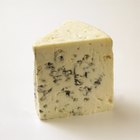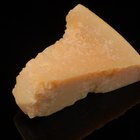
Because cheese is by nature aged, it's tempting to play fast and loose with old or expired fromage. However, sweet, soft ricotta cheese -- actually a byproduct made from the fermented leftovers of other cheeses -- is more susceptible to mold than most types of cheese. There's more than one way to tell if your ricotta has gone bad, and the process only takes a few moments.
Step 1
Smell the ricotta when you purchase it. While rotten meats are easy to identify by scent, cheeses are often naturally pungent, so it can be difficult to tell if your ricotta has gone bad by smell alone. Still, a sniff test serves as your first line of defense -- give the ricotta a whiff and compare its scent to the one you've committed to memory. Trust your gut; if the cheese makes your stomach tingle or you sense the damp tinge of mold, play it safe and ditch it. Generally, bad ricotta smells like spoiled milk.
Step 2
Look for signs of mold. Observe the color of the cheese -- on ricotta, mold usually appears as a pale pink tinge or as blue or green spots. If the cheese has any signs of mold, dispose of it immediately. While mold can be safely removed from hard cheeses, its spores easily penetrate soft cheeses such as ricotta.
Step 3
Check the date. As a young cheese, ricotta only has a shelf life of about two weeks from its purchase, or seven to 10 days from opening. If the cheese has an expiration date, follow it to be on the safe side. Otherwise, stick a piece of tape on the container and mark it with the date you purchased the cheese.
Related Articles

How to Tell if Mozzarella Is Bad

Does Blue Cheese Spoil?

What Happens to Cream Cheese if It's ...

Can You Make Homemade Mozzarella Cheese ...

How to Store Cheese

How to Freeze Cheeses
Can I Eat My Cheddar Cheese Past the ...

How to Age Cheese at Home

How to Store a Cheese Wheel With a Wax ...

Aged Cheeses That Do Not Melt

How to Make Muenster Cheese

How Can I Get Brie to the Right ...

How to Cook Elbow Macaroni in Milk
How to Pan-Fry Cheese
How Long Can I Store Grated Pecorino ...

The Dangers of Roquefort Cheese

Firm Ricotta Cheese Cannoli Filling

How Long Can You Refrigerate Nacho ...

Cheeses Similar to Feta

How to Store Parmesan Cheese
References
Resources
Tips
- While harder, more aged cheeses do best with a bit of ventilation, ricotta is a fresh cheese. Airtight containers serve as its safest and most taste-friendly storage option. Store this cheese your in your refrigerator's cheese, butter or vegetable compartment.
Warnings
- Play it safe with ricotta. Bad ricotta may contain the bacteria listeria, which can lead to a type of food poisoning known as listeriosis. Older people, pregnant women, small children and those with weakened immune systems are especially susceptible to listeriosis, which causes fever, muscle aches and diarrhea.
Writer Bio
With a diverse professional background and a decade of experience as a freelance writer, Dan has contributed lifestyle content -- from fashion to travel to fitness and more -- to publishers including Chron, Fortune, Sony, GlobalPost, ModernMom, Moviefone, Salon.com, Techwalla and dozens of others.
Photo Credits
Jupiterimages/Comstock/Getty Images